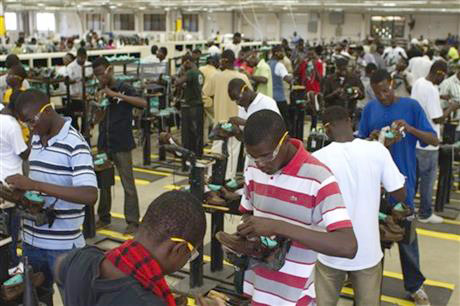
BERLIN – Question: What does the U.S. have in common with, among other nations, Argentina, Bahrain, El Salvador, Haiti, Hong Kong, Iraq, Iran, Mexico and Yemen?
Answer: Those nations, and the U.S., are among the 30 countries who earned a low grade of “4” on a 1-to-5 scale in a comprehensive report on workers’ rights worldwide.
The report, released on May 18 at the International Trades Union Congress (ITUC) in Berlin, paints a generally gloomy picture of workers’ rights. It notes only 200 million of the world’s workers – 7 percent – are members of non-government-run unions, with an equal number in government-controlled organizations.
And only 60 percent of the world’s workers are in the formal economy, leaving the rest to perform in informal sectors, whose workers are the most-exploited, ITUC says.
“Workers are struggling everywhere for their right to collective representation and decent work deficits exist in varying degrees in most countries,” ITUC reports. “Abuses of rights are getting worse, not better, and too many countries take no responsibility for protecting workers rights in a national context or through corporate supply chains.”
Workers are fired or suspended for trying to negotiate better working conditions in at least 53 nations, ITUC said. In most, they got little or no legal protection. “Indeed, employers and governments are complicit in silencing workers’ voices against exploitation,” it declared.
ITUC delegates set a goal of organizing 20 million more workers worldwide into non-government-run unions during the next four years. Their targets would be “migrant workers or workers in the informal sector; and individuals or groups of workers who are determined to act collectively for rights and social justice in unorganised sectors,” ITUC said.
“We cannot and we will not stand silent while workers are impoverished through the supply chains of big business and attacked by their own governments,” ITUC President Sharan Burrow, an Australian, told the delegates.
“Our own ITUC global poll tells us 94 percent of people want to strengthen international rules to make companies around the world provide better wage and labour conditions. A mini-mum living wage and a social protection floor are the foundations of dignity and decent work.”
But other international institutions aid companies and governments in the race to exploit workers, Burrow said. She singled out the World Bank’s Doing Business report, long a target of union criticism, for saying that: “Doing business is best, they say, where employment protections and rights are weak.” That’s “a big-business scam,” Burrow added.
“Doing business in this context is a crime against humanity,” she declared, which is why the ITUC compiled its first-ever counter-report. Its Global Rights Index is subtitled “the worst places in the world for workers.” But it’s not just a handful of bad-apple countries, repressive regimes or failed states that are guilty of trampling on workers’ rights.
“Where not to work is the counterpoint to the advocacy of big business to destroy the rights of workers,” Burrow said. “Employers have stepped up their anti-union attacks. The drive to export the American corporate model is global. The attacks on the European social model are deliberate, well planned and well resourced. Like the IMF, the American Chamber of Commerce issues their policy prescriptions everywhere and they use the threat of capital flight” to force companies and countries to hew to their views.
The result ranges “from opposition to the minimum wage in Moldova to the opposition of collective bargaining in Romania to a demand for reduction in wages in Belgium!” said Barrow. Qatar said job deaths and injuries “would not happen if workers took more responsibility!”
Developed nations are not immune to trampling on workers, Burrow warned. She singled out the Deutsche Telekom’s denial of rights to workers at its T-Mobile subsidiary in the U.S., even while DT obeys German labor law – which is much more pro-worker – there. The Communications Workers are engaged in a long campaign to organize T-Mobile. “We have a message for DT-we expect better and we don’t give up!” Burrow said.
The ITUC rated almost all the world’s nations on 97 criteria. They included the right to organize, threats against workers, murders of unionists, exclusion from collective bargaining or the right to strike, and, among positive indicators, “effective legal guarantees against anti-union discriminatory measures.” In Vietnam, Laos, Cuba and a few republics in the South Asian section of the former Soviet Union, ratings were impossible, ITUC admitted.
“Unions in countries with the rating of 4”-the U.S. and 29 others-“reported systematic violations against workers. The government and/or companies are engaged in a serious effort to crush the collective voice of workers, putting fundamental rights under continuous threat,” the ITUC said.
ITUC gave its lowest rating, “5,” to 24 nations, including Colombia, Guatemala, Korea and China. A wire story noted Guatemala now leads the world in murders of trade unionists per 100,000 workers, passing Colombia, though Colombia still leads in overall murders. ITUC deemed another eight nations “failed states.” They’re so disrupted by revolution (such as Syria), war (both Sudans, Ukraine) or occupation (Palestine), that ITUC gave them a “5+” mark, explaining workers have “no guarantee of rights due to the breakdown of the rule of law.”
Other than China and Korea, most U.S. trading partners received marks of “3” or better. “Threes” went to 34 nations, including Britain, Canada, Venezuela and Israel. The 29 “2”s included Japan and Russia. The 18 “1”s were France, Germany, 12 other European nations, Barbados, South Africa, Togo and Uruguay
Photo: International trade union leaders say the U.S. ranks with countries like Haiti when it comes to workers rights. In this photo workers toil in a Haitian shoe factory cited for cheating employees out of their wages. The U.S.-based Worker Rights Consortium says in a report that workers receive an average of 32 percent less than what they should. (AP Photo/Dieu Nalio Chery, File)












Comments